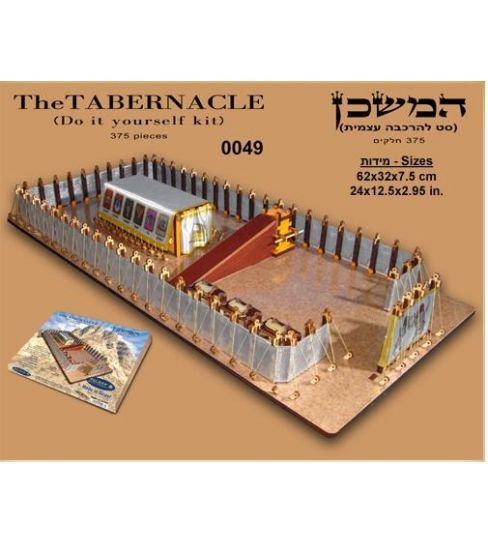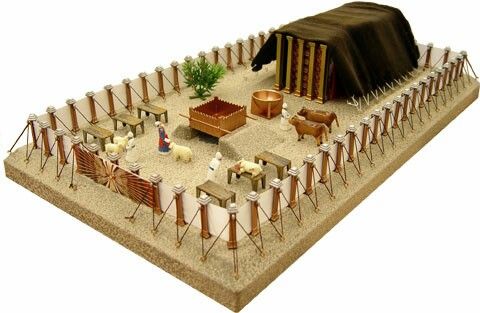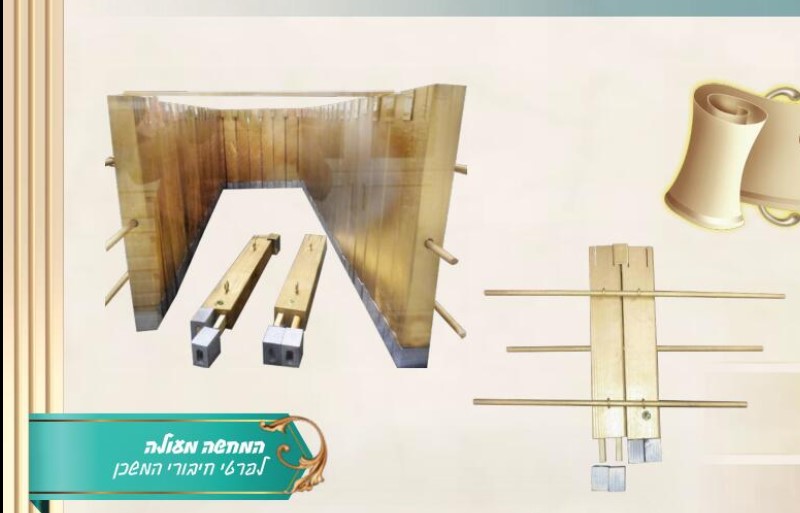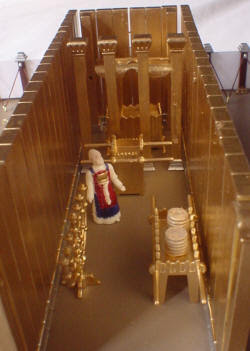Terumah ~ the quiet before the storm

Summary: Terumah introduces the laws regarding the mishkan, or the portable temple. Materials, colors, sizes and distances form the entirety of this portion, and the next portion which is Tetzaveh. This portion deals with the kelim, the vessels, whereas the next portion will deal with the kohanim and their clothes. The best summary of this portion is right here, as the miniature mishkan made by the kids from Hebrew School last year. I like to think of these portions as the quiet before the storm. In the arc of the story, we know what is happening – Moshe is up in the mountain, receiving all these laws, and the laws of the previous portion, Mishpatim. We know what is going to happen – the Golden Calf. So the Editor, depending on how you understand revelation the word Editor has a capital E or not – the Editor has decided to give us a break. So, as we say – let’s talk about something more pleasant, shall we?
==
KS – VeShachanti betocham
The opening of our portion is the list of materials required. Two beautiful lines jump up from there:
“from every person whose heart inspires him [or her] to generosity, you shall take My offering” – if this project of construction was about God, it would make sense that God would require those donations. To command them to build. It would be easy to say “Make ME a beautiful big wonderful house! After all I took you out of Egypt! I made miracles upon miracles! You owe Me” but that is not what happens. Really, I want to wager that this is not about God at all.
First, this sentence: “from every person whose heart inspires him [or her] to generosity, you shall take My offering” – people are to give from their hearts, becaue they want to. Not because they are told they must. It is not a business deal we have with God, it is not transactional, it is a relationship based in love and recognition. There are those who can’t see the love, there are those who think that God owes them. Those don’t have the ability to give. And that is fine. God want this to be a moment of growth: only those whose hearts are moved, who can see the miracles, who experience life as a flow of love – those give, and Moshe and the rest of the building crew, including Betzalel, receive.
And then another sentence: “they will build a Mikdash and I will dwell among them”. It is not written what you would expect, which I God will dwell in it, the word would have been betocho. It is written betocham, in them or among them.
This project is not about God at all – it is about creating a place for God’s presence to dwell, between people and inside each person. The Mishkan, the Tabernacle, then, can be re-read not just as a set of laws about a place, to make a certain structure and do certain actions in that structure. The mishkan is a place inside us as well. It is a reminder of how we behave with each other, and what actions reveal God’s Presence in this world, and what actions, God forbid, cover that Presence, hide that Presence. It is not by accident that God’s Presence in the world is called in Hebrew Shechinah, from the word to dwell, leshachen, just as we have veshachanti betocham, I will dwell among them or in them.
What kind of community are you creating? What kind of world are you creating with your actions, your words, your time, your possessions? Those are the questions that this portion, read every year, insists in asking us. How can your heart be moved to giving? How can you become a place for dwelling of God’s presence?
It is Torah, mitzvot, but also something else: kindness. Mercy. Acceptance of the other.
Years ago, I was attending a very very very orthodox shul in LA on Shabbat. I liked it because Hebrew was the main language, it was in walking distance, the kiddush was good. The service went fast, they read every word, the Torah service had a practice of men pledging money before each alyiah, and the wife, if he had one, would also stand for the reading – of course, from the women’s side. The Torah study was interesting, and by now you know how I also didn’t like the place at all: I had the wrong genes to enjoy it completely, egregated as I was behind the curtain. But the greatest lesson I received from that rabbi was a Shabbat when a man, clearly not Jewish, clearly with some mental health issues, came into the place. He walked around, seeming dazzled, and some of the regulars wanted to shoo him away. The rabbi stopped them, and let the man stay. And then, of course the man sits on one of the chairs in front of the ark. Now, some of the regulars were sure the rabbi would see their point: that man did not belong there at all. They again made a movement to take the man, and again, the rabbi stopped them.
Later, during kiddush, I overheard the rabbi’s conversation with the regulars: what do we know? Maybe the man was here for a tikkun of his soul. Maybe he was Eliahu HaNavi. What do we know about the world? Do you think you know it all?
So maybe that is why I hung out in that place for a while. Because that rabbi was teaching an important lesson: a place where God Presence dwells is not just bricks and a Torah, but it is, more important, our hearts, and this is expressed by how we treat those who are not “US” at all.
Shabbat Shalom
==
~ Why do we have, in your opinion, such exact descriptions and measures for the Mishkan?
~ Why are we spending so many words on the walls of the Tent of meeting?
~ If the construction of the mishkan is supposed to be so God would dwell among the people, or inside the people, how do all these descriptions indicate the transcendent, in your opinion?
Noam Elimelech on Terumah
The Torah, we all know, speak for every individual at every time. So how can we make sense of these details, in this portion and the next? Every measure is called “middah”. “Middah” is also the word for attributes, as in personal attributes, character traits. The text says “shachanti betocham”, in them, and not in it.
Meaning, God is not dwelling in the structure we build outside, but as we build the structure, God’s presence dwells inside a person. How is that accomplished? By developing good character traits. Now it is known that God has 13 attributes of mercy:
Ad-nai, Ad-nai, E-L Rachum etc. They are read as: “Ad-nai, Ad-nai, a benevolent God, compassionate and gracious, slow to anger and abundant in lovingkindness and truth, preserving lovingkindness for thousands, forgiving iniquity, rebellion and sin, and pardoning.
And there is one idea in the Talmud, which is so good that is brought as part of the daily morning study, which is the question of how does one walk in God’s ways? You have to follow God’s attributes. Just as God is compassionate, you too should be compassionate. Just as God visits the sick, clothes the naked, comforts the mourning, buries the dead, does acts of lovingkindness – so too you should do all that. That is walking in God’s ways.
So by developing our good character traits, that is how we become a place where God’s presence dwells. That is how God dwells within us.
The Noam Elimelech goes to talk about precisely the question of the walls of the Tent. They are called karesh, and you heard that word a lot, or its plural, krashim, in the reading today. There are several lessons he brings from that reading, but I want to highlight one: The planks, the krashim, have the same letters of the word “lie”, but in a completely different order.
And they are the basis, the walls, what sustains the most important piece of the Mishkan, those walls of the Tent of meeting, where the menorah, the table of the bread of faces, the incense altar and the aron haedut, the ark of the covenant, are all found. They are the basic thikng you need to house those holy objects, and all these objects ALSO are metaphors for our internal reality. But what is the base? The base are the planks. And how do we develop good attributes? By breaking the attribute of lying, because the planks have the same letters in a completely different order.
lie = שקר
plank = קרש
All the good attributes, the Noam Elimelech says, are dependent on being far away from lies, because lies are the basis for all other negative attributes, such as greed, stealing, arrogance, dishonesty, manipulation and so on.
It is in our very hands to become the sanctuary for God’s presence. Every single one of us can be and do better than yesterday. May this be a week of growth and developing good attributes.
